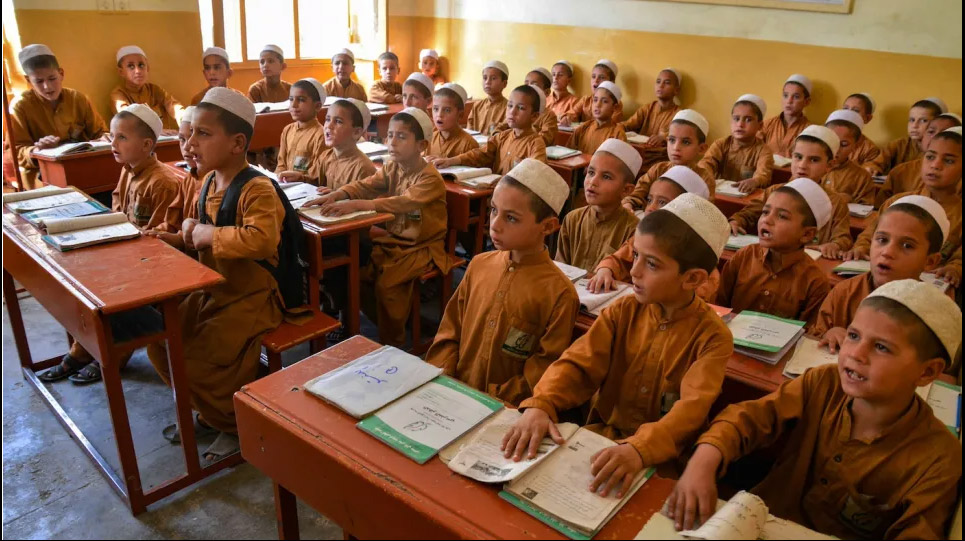
Afghan orphan boys attend a class at the Sheikh Zayed orphanage in Kandahar on September 19, 2023. (Photo by SANAULLAH SEIAM/AFP via Getty Images)
Sola Mahfouz, opinion contributor
Abandoned by the world, Afghanistan’s youth are trapped in a nightmare. They grew up under two decades of American influence, dreaming of a future where they could pursue their education. But the Taliban have snatched away their dreams, turning education into a joke.
Education is like a window to the world, as my grandfather used to say. A window that lets you breathe in the wisdom of others and exhale yours to them. It sets you free.
Learning is sacred to me. It confirms my being in this world. I am an Afghan woman, a quantum researcher and an essayist. I am working on a screenplay and a novel. But the current masters of my country deny my right to exist. I mourn for the boys and girls in my homeland. They are trapped in the Taliban’s darkness.
I wonder what my life would be like if I were there. My mind would be caged in their ignorance. I would never savor the intellectual freedom that I enjoy now in the United States.
A recent Human Rights Watch report warns that the Taliban have irreparably harmed the education of Afghan boys, who are often ignored in the media. The Taliban are taking over the schools of Afghanistan and erasing everything that makes the country rich and diverse. They are removing lessons on arts, sports and civics as well as pictures of animals and humans. They are silencing words that speak of democracy, human rights, peace, women’s rights and education. They are banning stories of the great poets and writers that reflect colorful cultures. They are removing the names of great scientists. They are replacing them with their own narrow and rigid vision, one that aims to fill young minds with violence, intolerance and extremism.
Young boys have shared their stories of being singled out in the morning assembly by the Taliban officials from the Ministry for the Propagation of Virtue and the Prevention of Vice for owning a cellphone, sporting a haircut considered too “westernized,” or wearing colorful clothes. They are dragged to the front of the crowd, their hair is cut with scissors, their feet are whipped.
One of my relatives was once among the brightest students of his school, a prestigious institution that produced graduates who won scholarships abroad or pursued higher education in their homeland. But now, he says, he is only going to school for his father’s sake. He has given up on his dreams of going to university. The Taliban have decreed that all students must spend two years learning their version of religion, no matter what they want to study further. He is one of the many who have seen their future destroyed by the new Afghanistan.
In the global conversation about Afghanistan, boys are often overlooked, as if they don’t deserve the same sympathy as girls. The Taliban’s rules are harsher for girls and women, but the boys suffer too. They grow up with violence as their only teacher, their only truth. They are whipped in school, where they learn nothing but the Taliban’s dogma. They are caged in a house of fear, with no windows to see the world outside.
I wonder what these young men in the making will bring to Afghanistan and the world when they mature in this bleak environment. Should they be blamed for it?
My mother tells me the story of my older brother. He was a teenager when the Taliban last controlled Afghanistan, and he rebelled against their oppressive rule. One day, he came home from school, flung the black turban that they forced him to wear onto the ground, and declared that he was done with education. He did not want to become a Talib, he said. He did not want to dress like them or learn what they taught. He feared that if he did, he would end up like them. So he left his school and joined a secret class. There, he learned things that the Taliban banned, like literature, history and science. It was his way of resisting, of surviving those dark years.
The internet is a tool that we can use to aid the children of Afghanistan and preserve the spark of liberal education in these bleak times. While politicians negotiate with the Taliban and pressure them to change, we can craft a curriculum that allows young boys and girls to taste an education that is free and offers them a respite. If the Taliban are militantly depriving them of every opportunity, we should be militantly creating every opportunity. Afghanistan is a young nation. Most young Afghans have access to the internet and are hungry for knowledge. They just need a chance.
Do we have the courage to give it to them?
We must stand with them and support their right to education, which is the foundation of peace and development. We must not let the Taliban extinguish the light of knowledge that shines in their minds. We must help them open the windows to the world. We must help them survive these dark times.



